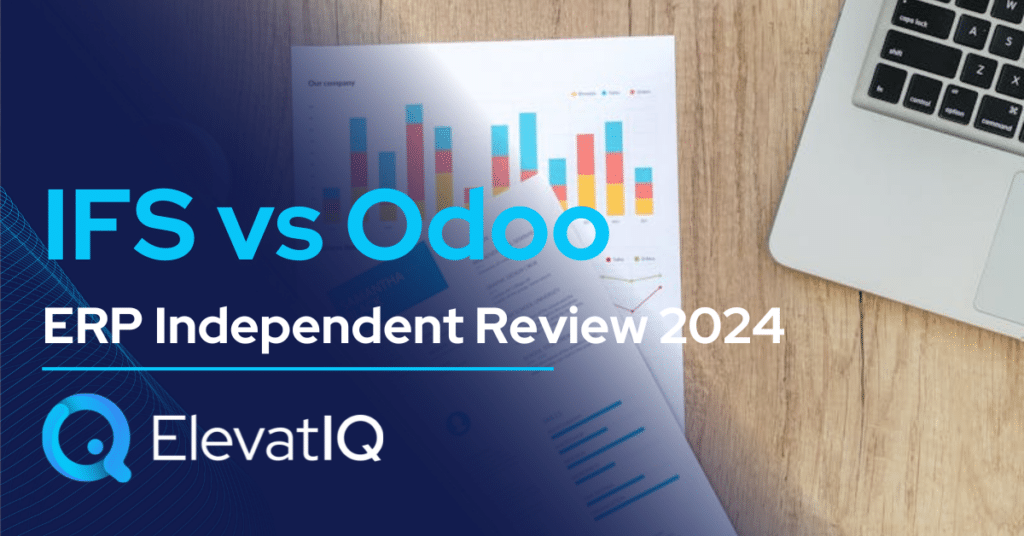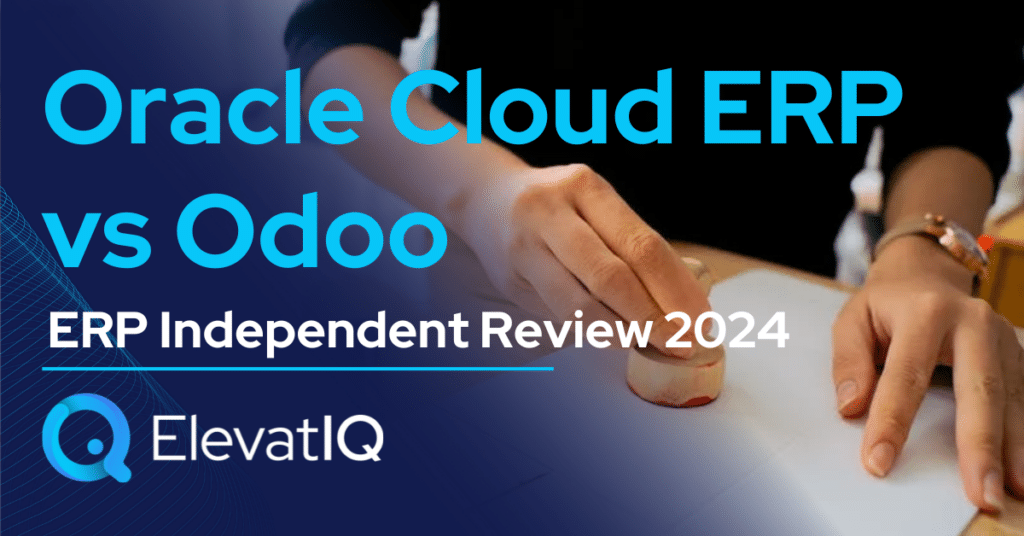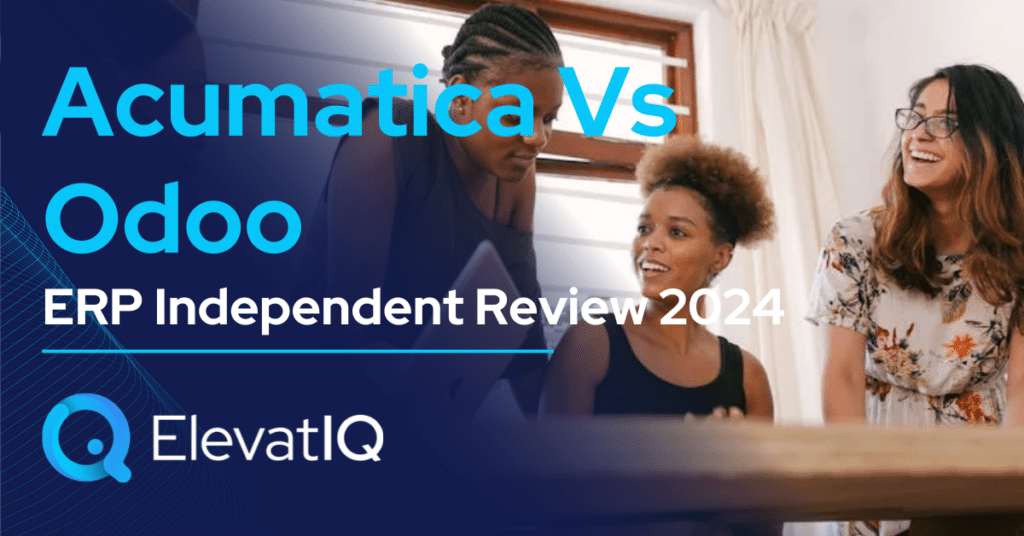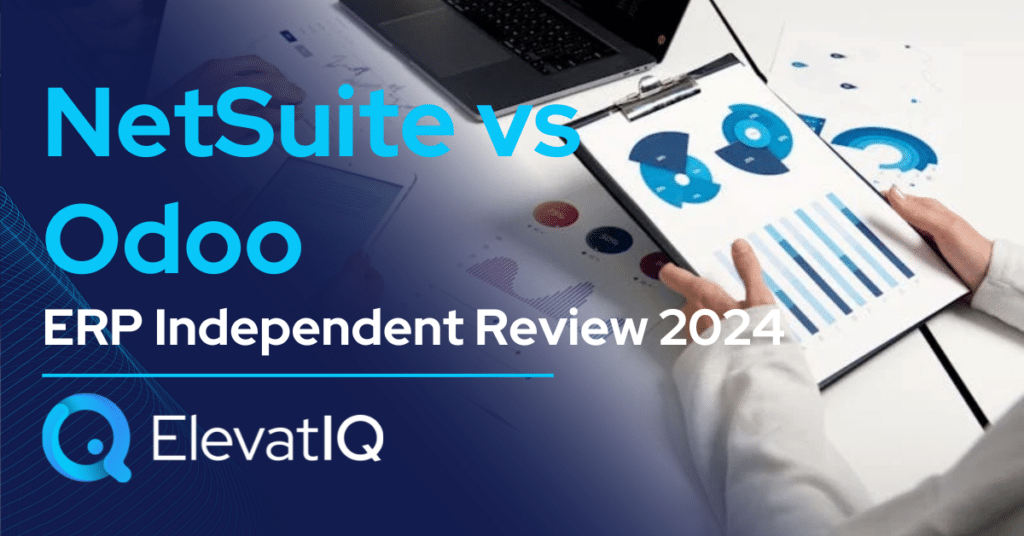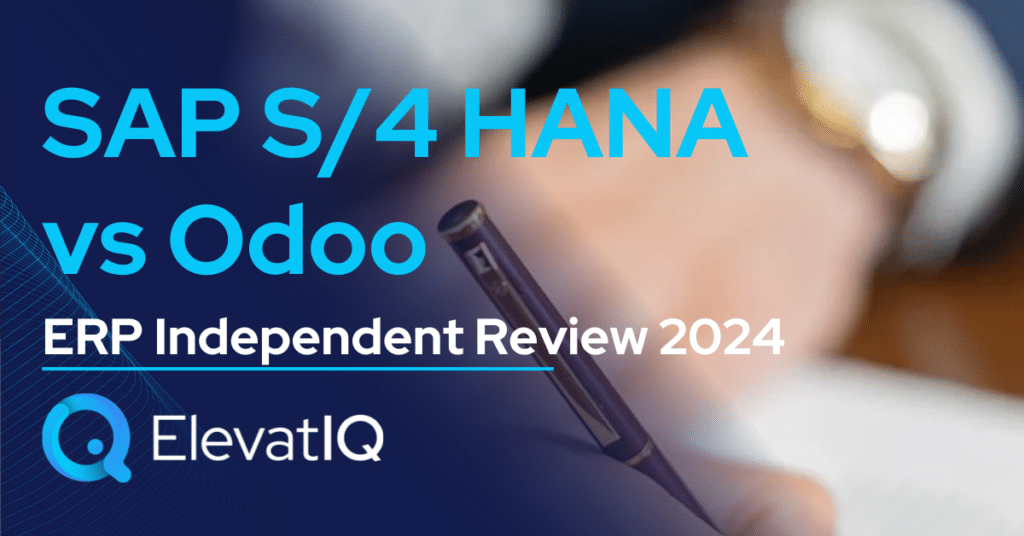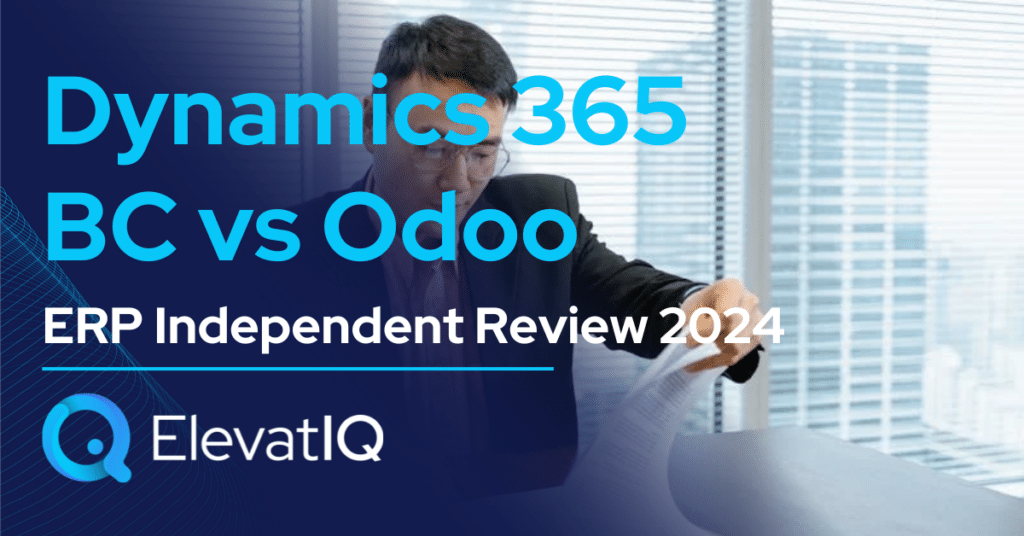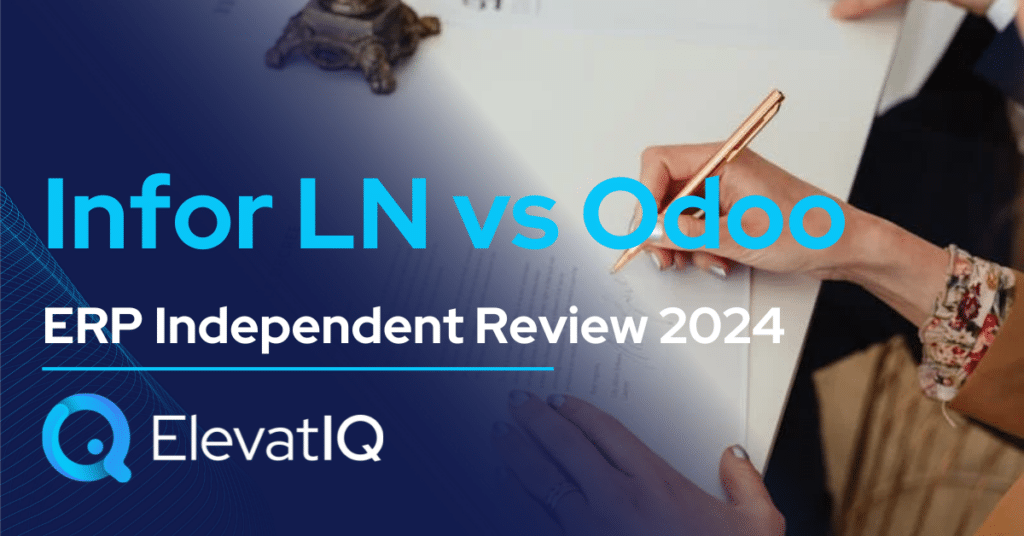Similar to other upper mid-market ERP solutions like Infor LN, QAD, or Sage X3, IFS boasts extensive functionality that is tailored for companies that are heavy in asset and field service operations. On the other hand, Odoo caters to smaller companies transitioning from QuickBooks or Xero, streamlining operations from various add-ons, spreadsheets, and applications. IFS is positioned for companies particularly within the $100M – $1B revenue range, with a significant portion nearing the $1B mark. Whereas, Odoo primarily caters to startups and smaller companies with revenue under $10 million.
IFS boasts robust global, multi-entity capabilities and also operates as a cloud-native solution. IFS not only delivers functional capabilities but also efficiently manages the transactional workload of upper-mid-market companies. Odoo’s unique advantage particularly lies in hosting operations across multiple countries in a single database.
IFS appeals to enterprises seeking mature, industry-specific capabilities, thus reducing the need for extensive development with vanilla ERP systems like SAP or Oracle. Odoo is an excellent choice for budget-conscious companies, especially those with in-house development teams. While Odoo’s modular design allows flexible app purchasing and provides scalability, it lacks tight integration at the data model level. Therefore, choosing between IFS vs Odoo requires a detailed examination, and this comparison offers valuable insights for ERP selection projects. Let’s delve deeper into the specifics.
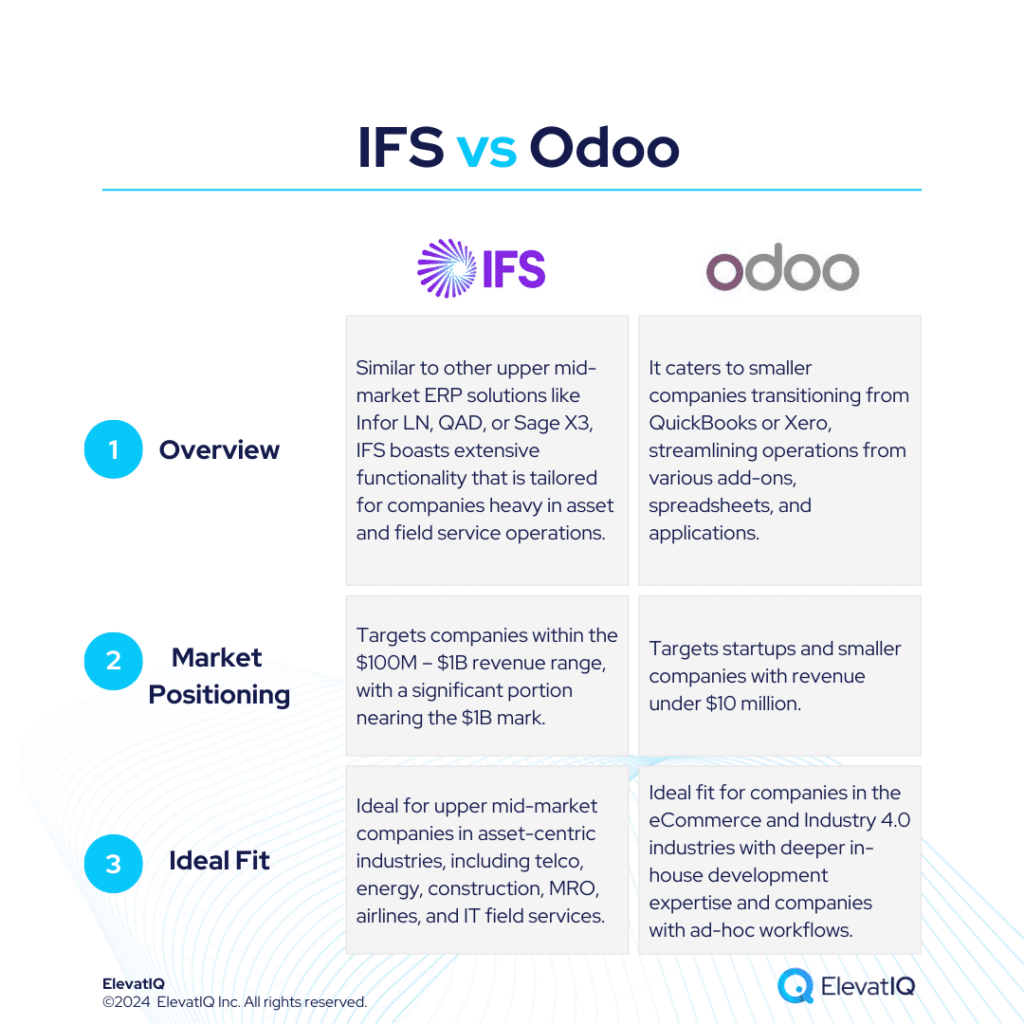

| IFS | Odoo | |
| Started in | 1986 | 2014 |
| Ownership by | EQT | Odoo S.A. |
| No. of customers | 6,500+ | 100,000+ relatively smaller companies |
What Is IFS?
Similar to other upper mid-market ERP solutions like Infor LN, QAD, or Sage X3, IFS also boasts extensive functionality. This functionality is particularly tailored for companies heavy in asset and field service operations. Positioned uniquely in the market, IFS also appeals to enterprises seeking mature, industry-specific capabilities, reducing the need for extensive development with vanilla ERP systems like SAP or Oracle. IFS serves as an optimal alternative in the upper mid-market space, offering standalone best-of-breed asset management and field service capabilities or a comprehensive ERP solution meticulously particularly crafted for asset-centric industries, including telco, energy, construction, MRO, airlines, and IT field services.
The IFS data model surpasses the complexity of smaller systems particularly like Acumatica or NetSuite, demanding an experienced internal team and external advisory support to successfully align process and data codings with the intricate IFS data model. It is an ideal choice for upper mid-market companies outgrowing smaller systems, such as Acumatica or NetSuite, and requiring mature capabilities for enterprise-wide asset scheduling and maintenance. IFS not only delivers functional capabilities but also efficiently manages the transactional workload of upper-mid-market companies.
IFS boasts robust global, multi-entity capabilities and also operates as a cloud-native solution. The majority of IFS customers particularly fall within the $100M – $1B revenue range, with a significant portion nearing the $1B mark. While IFS has its roots in Europe, they have been trying to grow its presence in North America. In 2023, IFS made strategic acquisitions to enhance its AI and shop floor capabilities.
What Is Odoo?
Odoo caters to smaller companies particularly transitioning from QuickBooks or Xero, streamlining operations from various add-ons, spreadsheets, and applications. It provides basic transactional processing across several enterprise software categories, such as ERP, CRM, and HCM. And a lot more in a consolidated database, also eliminating the need for costly integrations.
An excellent choice for budget-conscious companies, especially those with in-house development teams, Odoo may face challenges without guidance from experienced ERP consultants. While Odoo’s modular design allows flexible app purchasing and provides scalability, it lacks tight integration at the data model level. This limitation can be a concern for companies particularly aiming for stringent financial control at the data layer. This is especially true for less seasoned companies that might already struggle to regulate their internal process and data codings.
A rapidly growing platform with substantial funding and a large user base, it also primarily caters to startups and smaller companies with revenue under $10 million. Its unique advantage particularly lies in hosting operations across multiple countries in a single database. Distinguishing from solutions like QuickBooks or Xero, it might also use separate financial instances for each country. The other similar ERP systems designed for multi-entity operations might not contain CRM-specific processes.
IFS vs Odoo Comparison
Navigating the choice between IFS vs Odoo is a significant decision for businesses particularly looking for operational efficiency and strategic alignment. Thus, this section delves into the comprehensive comparison of IFS vs Odoo across various critical dimensions.
| IFS | Odoo | |
| Global Operational Capabilities | Has robust global multi-entity capabilities | Fit for smaller companies with entities in different countries. |
| Diverse Capabilities | Companies with a diverse business model might struggle | Supports diverse industries, including product and service-centric startups. |
| Best-of-breed Capabilities | Has one of the strongest field service and asset management capabilities. | Extremely limited best-of-breed capabilities. |
| Last-mile Capabilities | Often require add-ons for specific micro-verticals. | The last-mile capabilities for specific micro-verticals are limited. |
| Operational Functionalities | The operational capabilities would be deeper in some areas, making it a best-of-breed option for enterprise-grade asset and field service-centric use cases used alongside another ERP as a corporate ledger.. | Matrix functionality built as part of the inventory core. |
| Integration Capabilities | Good fit for those seeking best-of-breed field service capabilities for a subsidiary or integrated with a corporate financial ledger. | It lacks tight integration at the data model level, concerning for companies aiming for stringent financial control. |
| Manufacturing Capabilities | Has comparatively limited manufacturing capabilities. | Matrix functionality built as part of the inventory core. However, many advanced transactions may have limited support natively. |
| Pricing Model | Recurring subscription-based model | Per-user, per-app, per-month model |
| Key Modules | 1. Manufacturing 2. Supply Chain Management 3. Projects 4. Finance 5. Human Capital Management 6. Procurement 7. Customer Relationship Management 8. Commerce | 1. Sales 2. CRM 3. Inventory Management 4. Accounting and Finance 5. Purchase Management 6. Project Management 7. Manufacturing Management 8. Human Resources Management 9. Website and eCommerce |
IFS vs Odoo Feature Comparison
Both platforms offer a plethora of features and functionalities designed to streamline business operations and enhance efficiency. In this feature comparison, we delve into particularly the distinct capabilities of IFS vs Odoo across various critical dimensions, providing insights to aid businesses in making informed decisions regarding their ERP selection. Thus, this section discusses features under each of the following modules, particularly financial management, supply chain management, and manufacturing management.
Financial Management Comparison
In this section, we are discussing a detailed comparison of the financial management capabilities particularly offered by IFS vs Odoo. By examining their respective strengths and functionalities, particularly in managing financial processes. Businesses can therefore gain valuable insights to determine the best-suited ERP solution for their financial management needs.
| IFS | Odoo | ||
| Financial Management | General Ledger | Centralizes financial data management, enabling accounting, reporting, and also analysis. | A financial record-keeping system that tracks all financial transactions and integrates seamlessly with other modules. |
| Accounts Receivable and Accounts Payable | Streamlines customer invoicing, payment processes, vendor invoices and payments. | The AR tracks money owed to the business by customers, while AP manages money the business owes to suppliers. | |
| Cash Flow Management | Enables accurate planning and forecasting of cash activities, and analyze liquidity and cash positions. | Helps particularly monitor and forecast company’s cash inflows and outflows to ensure liquidity and financial stability. | |
| Currency Management | Handles transactions in multiple currencies, automatically calculating exchange rates and converting transactions into the base currency. | Supports multi-currency transactions, automatic exchange rate updates, exchange difference entries, foreign currency reports, and managing bank accounts in multiple currencies. | |
| Tax Management | Automates and manages tax calculations, compliance, and reporting across multiple jurisdictions. | Automates tax calculations, updates, and reporting, ensuring compliance and efficiency across multiple currencies and modules. |
Supply Chain Management Comparison
In this comparison, we explore and analyze the supply chain management capabilities of IFS vs Odoo, shedding light particularly on their respective strengths and weaknesses.
| IFS | Odoo | ||
| Supply Chain Management | Warehouse Management | Enables businesses to efficiently manage warehouse operations by automating the physical storage and retrieval of inventory items. | Optimizes inventory control, streamlines operations, and enhances visibility with real-time tracking and automated processes. |
| Service Management | Enables organizations to efficiently manage their field service operations, including planning, scheduling, dispatching, and mobile workforce management. | Streamlines service delivery, enhances customer satisfaction, and optimizes resource allocation with integrated project management and invoicing. | |
| Inventory Management | Provides real-time visibility into stock movements, allowing businesses to maintain optimal inventory levels by setting reorder points and reducing the risk of overstocking and stock-outs | Offers real-time tracking, multi-location management, and automated reordering to optimize stock levels and streamline operation. | |
| Purchase Order Management | Streamlines the procurement process by automating the creation, tracking, and approval of purchase orders, ensuring efficient and accurate order fulfillment. | Automates procurement processes, optimizes supplier interactions, and ensures accurate order tracking and invoicing. | |
| Sales Order Management | Efficiently handles the entire sales order process from quotation to invoicing, ensuring accurate order fulfillment and real-time tracking across multiple sites. | Streamlines the entire sales process, from creating and sending quotations to converting them into sales orders and managing invoicing, all within a single platform. | |
| Requisition Management | Simplifies the procurement process by allowing users to create, track, and approve requisitions, ensuring that all purchase requests are efficiently managed and fulfilled. | Streamlines the process of creating, reviewing, and approving purchase requisitions, ensuring compliance with budgets and procurement policies. |
Manufacturing Management Comparison
In this comparison, we explore and analyze the manufacturing management capabilities of IFS vs Odoo, shedding light, particularly on their respective strengths and weaknesses.
| IFS | Odoo | ||
| Manufacturing Management | Production Planning | Optimizes manufacturing processes by providing tools for capacity planning, production scheduling, material requirements planning, and shop floor control, ensuring real-time visibility and efficiency. | Optimizes manufacturing processes by efficiently scheduling, allocating resources, and managing work orders to meet production goals. |
| BOM and Routing | Streamlines manufacturing by detailing the components and materials needed for production and defining the sequence of operations required to produce a finished product. | Defines the components and operations required for manufacturing a product, thus optimizing production efficiency. | |
| Advanced Planning and Scheduling | Enhances manufacturing efficiency by optimizing resource allocation, production schedules, and material requirements through advanced algorithms and real-time data analysis. | Optimizes production by centralizing data, providing real-time visibility, and also automating scheduling to enhance efficiency. |
Pros of IFS vs Odoo
When evaluating ERP solutions, understanding the distinct advantages of IFS vs Odoo is crucial. In this section, we are particularly exploring the strengths of IFS vs Odoo across various dimensions. Thus, shedding light on their respective capabilities and functionalities.
| IFS | Odoo |
| One of the most consistent user experiences that have been rearchitected and modernized. | It is widely adopted, especially among Industry 4.0 companies and other machinery businesses. |
| One of the strongest asset-management capabilities for organizations with very thick asset and predictive maintenance needs. | It can support many different business models, many different localizations, countries, etc, as part of the same product. |
| Designed to handle large programs where consolidated visibility would be critical without ad-hoc arrangements. | The availability of cheaper technical talent globally helps product-centric startups extend or augment core capabilities |
| Unique financial workflows to support complex project manufacturing programs. | The lean data model and workflows make it easier for product-centric startups transitioning from QuickBooks-like solutions. |
Cons of IFS vs Odoo
Just like recognizing strengths is important, it’s also crucial to weigh the specific drawbacks of IFS vs Odoo. Therefore, in this section, we will delve into the limitations and challenges associated with IFS vs Odoo across various operational and financial dimensions.
| IFS | Odoo |
| Has a limited presence in North America and also a lean partner ecosystem. | The open-source nature leads to a tendency to over-customize, also resulting in an inferior product experience. |
| Companies with a diverse business model, might outgrow or struggle with the solution. | Consisting primarily of developers, the ecosystem particularly doesn’t have a seasoned program, change management, and business consultants. |
| Companies involved with the M&A or the ones part of the PE portfolio might not be the best fit for IFS. | The last-mile capabilities for specific micro-verticals are limited, requiring significant customization for their work with specific industries. |
| IFS might not be the best fit to be used just as the corporate ledger for large project manufacturing enterprises. | Mature capabilities such as MRP, allocation, and batch are not as detailed as with other richer ERP systems. |
Conclusion
In conclusion, both IFS vs Odoo offer distinct advantages depending on a company’s size, industry, and operational needs. IFS is an excellent choice for upper mid-market companies that require robust asset and field service management capabilities, especially those in industries like telecom, energy, construction, and IT services. Its comprehensive and mature features cater to organizations particularly looking for advanced functionality without the need for extensive development, making it ideal for businesses with complex workflows and high transactional demands. However, IFS’s more intricate data model and higher implementation requirements might not suit smaller, less experienced teams or companies with more diverse business models.
On the other hand, Odoo shines as a cost-effective and scalable ERP solution, particularly for startups and smaller companies transitioning from simpler systems like QuickBooks or Xero. Its modular design allows businesses to expand functionality as they grow, and it can also effectively support multiple countries within a single database. Odoo is best suited for companies with in-house development capabilities and a focus on eCommerce or Industry 4.0 sectors. While it may lack the tight data model integration and advanced functionality of larger ERP systems like IFS, its flexibility and accessibility make it a strong contender.
Both systems have their strengths and limitations, so businesses should carefully evaluate their specific need. Also, seeking assistance from an independent ERP consultant can significantly aid the decision-making process. To get a 360-degree view of feature comparisons, it’s essential to explore not only IFS vs. Odoo but also insights from other analyses such as IFS vs. NetSuite, SAP S/4 HANA, Oracle Cloud ERP, Dynamics F&O, Dynamics 365 BC, Infor LN, Infor M3, Epicor Kinetic, and Acumatica.



